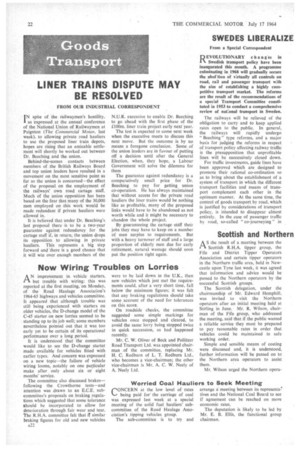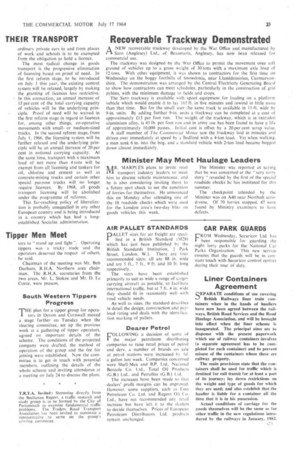SWEDES LIBERALIZE
Page 24

Page 25

If you've noticed an error in this article please click here to report it so we can fix it.
THEIR TRANSPORT
From a Special Correspondent
DEVOLUTIONARY c h a n g `es in I N. Swedish transport policy have been inaugurated this month. A programme culminating in 1968 will gradually secure the abortion of v:rtually all controls on road, rail and passenger transport w;th the aim of establishing a highly competitive transport market. The reforms are the result of the recommendations of a special Transport Committee constituted in 1953 to conduct a comprehensive review of nat:onal transport in Sweden.
The railways will be relieved of the obligation to carry and to keep applied rates open to the public. In general, the railways will rapidly undergo " Beeching " type reforms, and a major basis for judging the reforms in respect of transport policy affecting railway traffic is the presupposition that unprofitable lines will be successively closed down.
For traffic investments, guide lines have been approved which are designed to promote their rational co-ordination so as to bring about the establishment of a system of transport in which the different transport facilities and means of transport complement each other in the optimum manner. At the same time, the control of goods transport by road, which is justified by considerations of transport policy, is intended to disappear almost entirely, In the .case of passenger traffic by road, so-called " co-journeying " in ordinary private cars to and from places of work and schools is to bc exempted from the obligation to hold a licence.
The most radical change in goods transport is the progressive elimination of licensing based on proof of need. In the first reform stage, to be introduced on July 1 this year, the existing control system will be relaxed, largely by making the granting of licences less restrictive. In this connection, an annual increase of 15 per cent of the total carrying capacity of vehicles will he the underlying principle. Proof of need will be waived in the first reform stage in regard to licences for, among other things, co-operative movements with smallor medium-sized trucks. In the second reform stage, from July 1, 1966, the licensing system will be further relaxed and the underlying principle will be an annual increase of 20 per cent in national carrying capacity. At the same time, transport with a maximum load of not more than 4 tons will be exempt from all licensing and tankers for oil, chlorine and cement as well as concrete-mixing trucks and certain other special purpose trucks will no longer require licences. By 1968, all goods transport licensing will be abolished under the programme of reforms.
This far-reaching policy of liberalization is probably unequalled in any other European country and is being introduced in a country which has had a longestablished Socialist administration.
















































































































